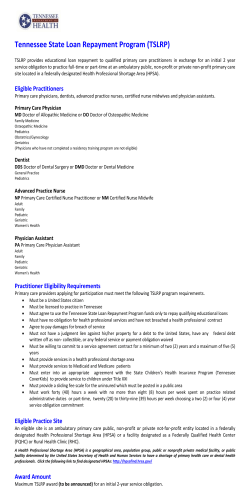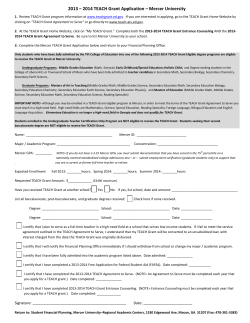
TEACH Grant Program Federal Student Aid
Federal Student Aid TEACH Grant Program What is the TEACH Grant Program? What is a TEACH-Grant-eligible program? The Teacher Education Assistance for College and Higher Education (TEACH) Grant Program provides grants of up to $4,000 per year to students who agree to teach for four years at an elementary school, secondary school, or educational service agency that serves students from low-income families and to meet other requirements. The terms and conditions of this teaching service obligation are explained in the TEACH Grant Agreement to Serve that you must sign before you receive a TEACH Grant (see "What is the TEACH Grant Agreement to Serve?" below). A TEACH-Grant-eligible program is a program of study that is designed to prepare you to teach as a highly qualified teacher in a high-need field and that leads to a bachelor's or master's degree, or is a postbaccalaureate program. A two-year program that is acceptable for full credit toward a bachelor's degree is considered a program that leads to a bachelor's degree. A postbaccalaureate program is a program for students who have already earned a bachelor's degree that (1) does not lead to a graduate degree, (2) is treated as an undergraduate program, and (3) consists of courses required by a state in order for you to receive a certification or license to teach in an elementary or secondary school in that state. A postbaccalaureate program is not TEACH-Granteligible if it is offered by a school that also offers a bachelor's degree in education. IMPORTANT: If you do not complete your service obligation, all TEACH Grant funds you received will be converted to a Direct Unsubsidized Loan. You must then repay this loan to the U.S. Department of Education (ED), with interest charged from the date the TEACH Grant was disbursed (paid out). What are the eligibility requirements? To receive a TEACH Grant, you must: Meet the general eligibility requirements for the federal student aid programs as described at www.studentaid.ed.gov/eligibility/basiccriteria. Complete the Free Application for Federal Student SM Aid (FAFSA ). Be enrolled as an undergraduate, postbaccalaureate, or graduate student at a school that participates in the TEACH Grant Program. Be enrolled in a TEACH-Grant-eligible program. Meet certain academic achievement requirements (generally, scoring above the 75th percentile on one or more portions of a college admissions test or maintaining a cumulative grade point average of at least 3.25). Receive counseling (on ED's TEACH Grant website at http://teach-ats.ed.gov) that explains the terms and conditions of the TEACH Grant service obligation. Sign a TEACH Grant Agreement to Serve. Schools that participate in the TEACH Grant Program determine which of the programs they offer are TEACH-Grant-eligible. A program that is TEACHGrant-eligible at one school might not be TEACHGrant-eligible at another school. Contact the financial aid office at the school you are attending (or that you plan to attend) to find out which programs at that school are eligible. What is the TEACH Grant Agreement to Serve? Each year that you receive a TEACH Grant, you must sign an Agreement to Serve on ED's TEACH Grant website at http://teach-ats.ed.gov. The TEACH Grant Agreement to Serve explains the terms and conditions of the service obligation you must agree to fulfill as a condition for receiving a TEACH Grant. By signing the Agreement to Serve, you agree to these terms and conditions and acknowledge your understanding that if you do not fulfill the service obligation, the TEACH Grant funds you received will be converted to a loan that you must repay. What are the terms and conditions of the TEACH Grant service obligation? In exchange for receiving a TEACH Grant, you must agree to the following: 1 For each TEACH-Grant-eligible program for which you receive TEACH Grant funds, you must serve as a full-time teacher for a total of at least four academic years within eight years after you complete or otherwise cease to be enrolled in the program for which you received the TEACH Grant. You must perform the teaching service as a highly qualified teacher at a low-income school or educational service agency. The term "highly qualified teacher" is defined in Section 9101(23) of the Elementary and Secondary Education Act of 1965 and in Section 602(10) of the Individuals with Disabilities Education Act. Your teaching service must be in a high-need field. You must provide ED with documentation of your progress toward completing your service obligation. If you do not meet the requirements of your service obligation, all TEACH Grant funds you received will be converted to a Direct Unsubsidized Loan. You must repay this loan in full, with interest charged from the date of each TEACH Grant disbursement. directory, visit www.tcli.ed.gov and click on the "Search" button. In addition, elementary or secondary schools operated by the Department of the Interior's Bureau of Indian Education (BIE) or operated on Indian reservations by Indian tribal groups under contract or grant with the BIE qualify as low-income schools. Can a TEACH Grant service obligation ever be suspended or canceled? You may request a temporary suspension of the eight-year period for completing your TEACH Grant service obligation based on: Your enrollment in a TEACH-Grant-eligible program or your enrollment in a program that a state requires you to complete in order to receive a certification or license to teach in that state's elementary or secondary schools. For example, if you received a TEACH Grant for an undergraduate program and you later enroll in a graduate program for which you would be eligible to receive a TEACH Grant, you could receive a suspension of the eight-year period for completing your service obligation for the undergraduate program while you are enrolled in the graduate program. A condition that is a qualifying reason for leave under the Family and Medical Leave Act (FMLA). A call or order to active duty status for more than 30 days as a member of the armed forces reserves, or service as a member of the National Guard on full-time National Guard duty under a call to active service in connection with a war, military operation, or national emergency. What are high-need-fields? High-need fields are bilingual education and English language acquisition, foreign language, mathematics, reading specialist, science, and special education, as well as any other field that has been identified as high-need by the federal government, a state government, or a local education agency, and that is included in ED's annual Teacher Shortage Area Nationwide Listing (Nationwide List).If you are planning to teach in a high-need field that is included in the Nationwide List, that field must be listed for the state where you teach either at the time you begin your qualifying teaching service or at the time you received a TEACH Grant. To access the Nationwide List, visit www.ed.gov/about/offices/list/ope/pol/tsa.doc. How can I identify schools or educational service agencies that serve low-income students? Elementary and secondary schools (public and private) and educational service agencies serving low-income students are listed in ED's annual "Teacher Cancellation Low-Income Directory." To access the Suspensions are granted in one-year increments, not to exceed a combined total of three years for the first two conditions listed above, or a total of three years for the third condition. If you receive a suspension, the eight-year period for completing your service obligation is put "on hold" during the suspension period. For example, if you receive a one-year suspension after two years of the eightyear period for completing your service obligation have elapsed, you would have six years left to complete your service obligation when the one-year suspension period ends. 2 Your TEACH Grant service obligation may be canceled (discharged) if you die or if you become totally and permanently disabled. You may also receive a discharge of some or all of your four-year teaching requirement if you are called or ordered to qualifying military active duty for a period that exceeds three years. More information is available at www.disabilitydischarge.com. If I’m interested in receiving a TEACH Grant, where can I get more information? Contact the financial aid office at the school where you will be enrolled to find out whether the school participates in the TEACH Grant Program and to learn about the programs of study at the school that are TEACH-Grant-eligible. This information was updated in the summer of 2013. For updates or additional information on federal student aid, visit StudentAid.gov. July 2013 3
© Copyright 2026











